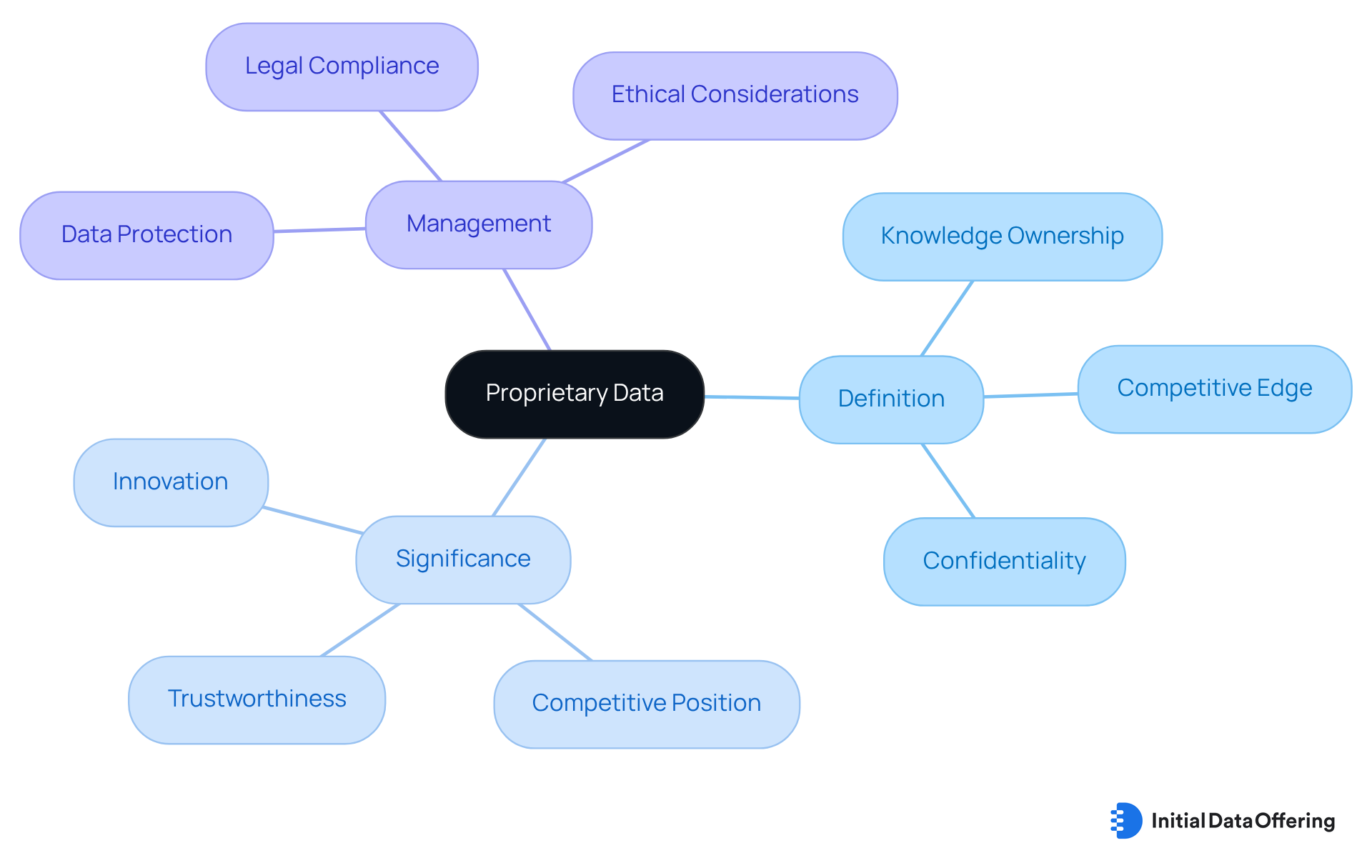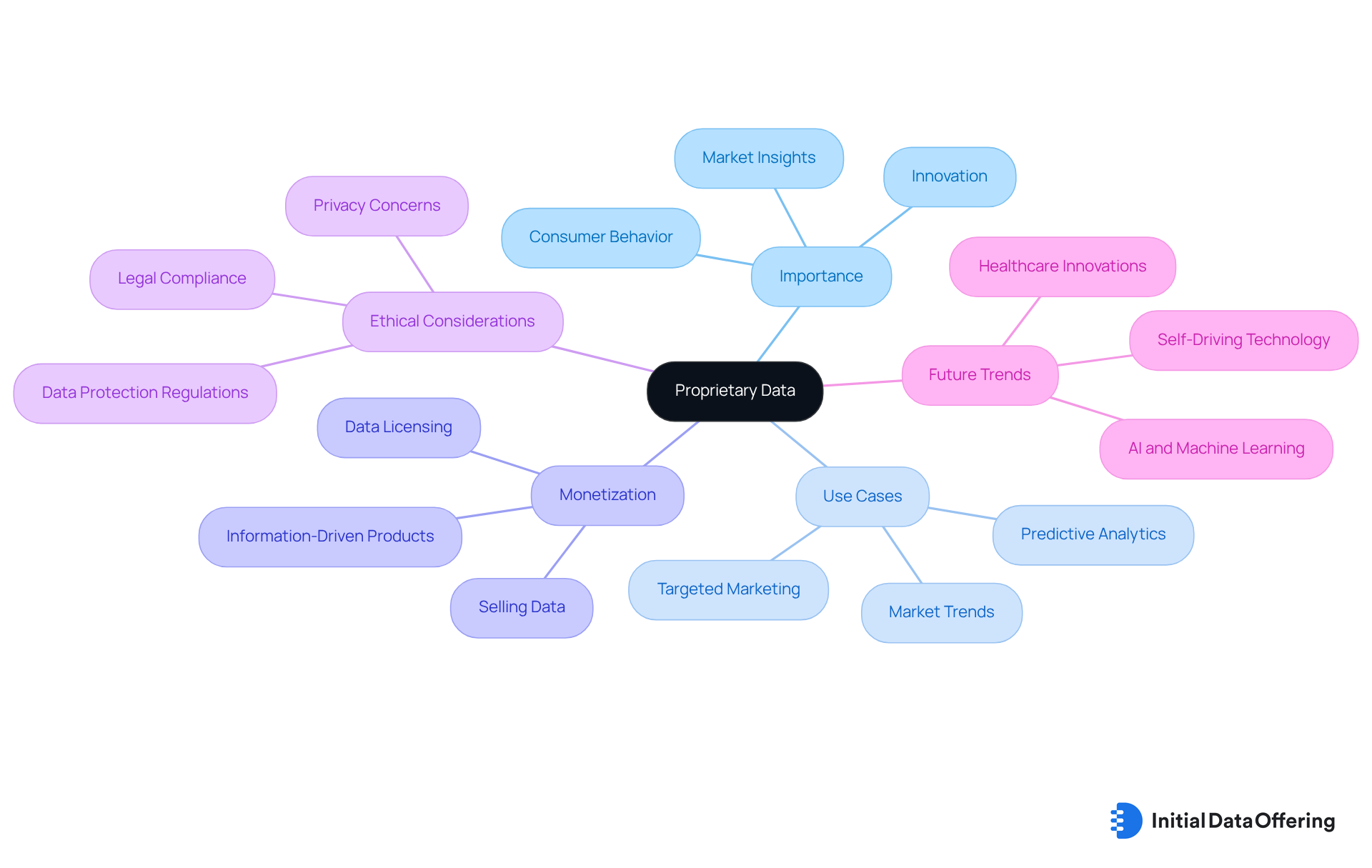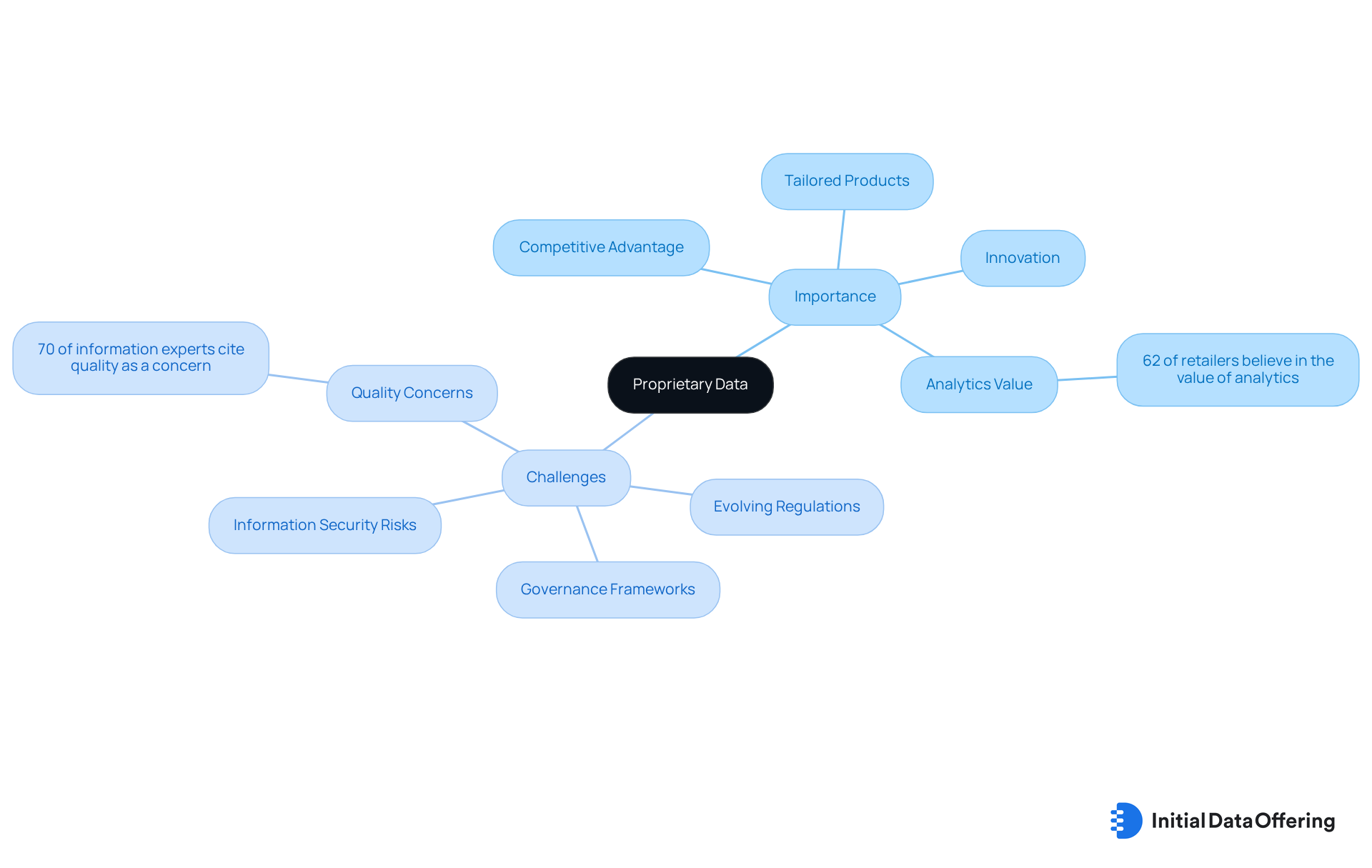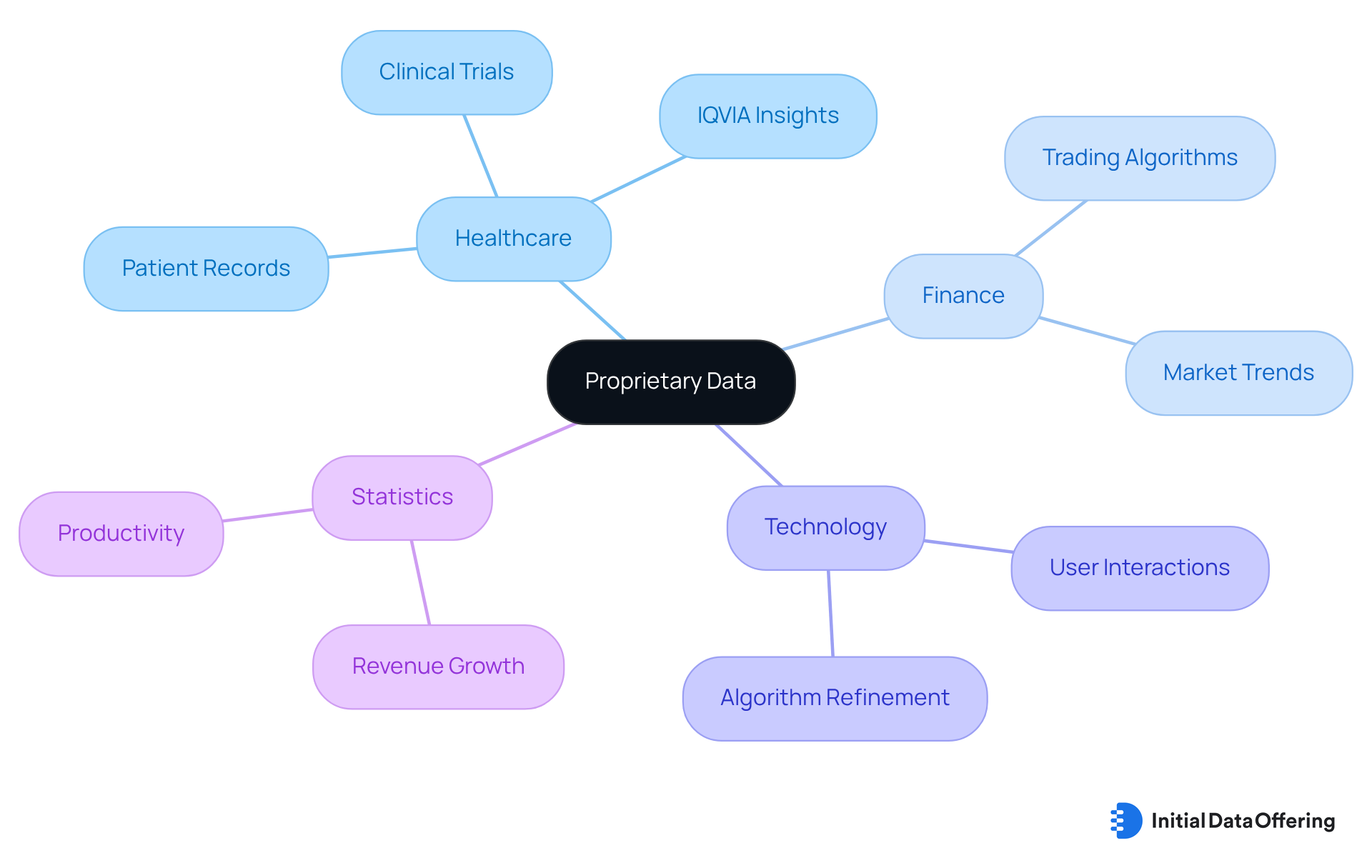What is Proprietary Data? Understanding Its Importance and Context

What is Proprietary Data? Understanding Its Importance and Context
Overview
Proprietary data is exclusive information owned by an organization that remains inaccessible to the public. This type of data is crucial for maintaining a competitive advantage in the marketplace. Effective management and protection of proprietary data—such as trade secrets and customer lists—safeguards sensitive information. Moreover, it fosters innovation and strategic growth. This highlights the importance of proprietary data across various industries.
How does your organization manage its proprietary data? By prioritizing its protection, companies not only secure their sensitive information but also enhance their capacity for innovation. The management of proprietary data can lead to significant advantages, such as improved decision-making and strategic positioning in the market. In turn, these advantages can translate into tangible benefits, including increased market share and customer loyalty.
In conclusion, the effective management of proprietary data is essential for organizations seeking to thrive in competitive environments. It serves not only to protect valuable information but also to drive growth and innovation, making it a vital consideration for businesses today.
Introduction
Understanding proprietary data is crucial for businesses aiming to maintain a competitive edge in an increasingly information-driven landscape. This exclusive knowledge encompasses features such as trade secrets and customer insights, which provide organizations with unique advantages. However, these advantages come with significant challenges in terms of security and compliance.
As companies navigate the complexities of managing proprietary information, a pressing question arises: how can they effectively leverage this valuable asset while safeguarding it against potential threats?
This article delves into the essence of proprietary data, its importance across various industries, and the strategies organizations can employ to harness its full potential.
Define Proprietary Data: Understanding Its Core Concept
What is proprietary data refers to knowledge owned by a person or entity that is not publicly accessible. This information is often distinctive to the entity that produces it, providing a competitive edge in the marketplace. Such details may include trade secrets, customer lists, internal research findings, and, importantly, what is proprietary data that a company seeks to keep confidential. The possession of exclusive information allows entities to manage its dissemination and utilization effectively. This ensures that sensitive content remains safeguarded from rivals and unauthorized access.
Why is this significant? Understanding what is proprietary data and the ability to protect it can be a game changer for businesses. By maintaining confidentiality, companies can secure their unique advantages and foster innovation without the fear of competitors gaining access to their critical insights. The strategic management of proprietary details not only safeguards a company's interests but also enhances its credibility and trustworthiness in the market.
In conclusion, understanding what is proprietary data and managing it effectively is essential for any organization aiming to maintain a competitive position. By recognizing the value of such information and implementing robust protection measures, businesses can ensure their sensitive content is well-guarded, ultimately leading to sustained success.

Contextualize Proprietary Data: Its Role in the Data Ecosystem
Within the information ecosystem, exclusive information serves as a crucial resource for organizations seeking insights into market trends and consumer behavior. Its unique methodologies and internal processes distinguish it from public information, illustrating what is proprietary data and making it a valuable asset for businesses. For instance, companies like Initial Data Offering (IDO) leverage exclusive datasets to deliver tailored insights that empower clients to make informed decisions. The distinctiveness of exclusive information highlights what is proprietary data, as it not only enhances its value but also fosters innovation, enabling companies to develop products and services based on insights derived from their unique datasets.
Moreover, organizations can monetize exclusive information by either selling it to external parties or creating information-driven products, underscoring its financial significance. However, ethical considerations in acquiring exclusive information are paramount, as organizations must navigate legal compliance and privacy concerns. As we approach 2025, the strategic use of exclusive information will continue to shape market dynamics, with predictive analytics allowing companies to stay ahead of competitors and adapt strategies based on emerging trends. Fields such as self-driving technology and AI-enhanced medical imaging exemplify the effective utilization of exclusive information, highlighting its importance across various industries.
How can your organization harness exclusive information to drive innovation? By understanding what is proprietary data, including its features, advantages, and the benefits it offers, businesses can position themselves to thrive in an increasingly competitive landscape.

Highlight Importance: The Value and Challenges of Proprietary Data
What is proprietary data refers to details that are uniquely owned or controlled by an organization, representing a critical asset that offers unique insights to enhance decision-making and strategic planning. Businesses that utilize exclusive information efficiently can significantly improve their market standing, tailor their products to meet customer requirements, and foster innovation. In fact, 62% of retailers believe that information and analytics provide a competitive advantage.
However, understanding what is proprietary data presents several challenges. Key issues include:
- Information security risks
- Adherence to evolving regulations
- The necessity for robust governance frameworks
Organizations must implement strict measures to safeguard sensitive information from breaches and unauthorized access, thereby maintaining their competitive edge.
As information privacy regulations tighten, understanding what is proprietary data and navigating the complexities of ownership and usage rights becomes increasingly vital to protect proprietary details. Furthermore, 70% of information experts indicate quality as their primary concern, highlighting the significance of upholding high standards in information management. Firms such as Slevomat have demonstrated that efficient information usage can result in considerable revenue growth, with a 23% rise in sales linked to enhanced decision-making based on insights. Additionally, companies can explore capitalizing on exclusive information by selling it to external parties, which adds another dimension of strategic worth.
By prioritizing information security and governance, organizations can unlock the full potential of their exclusive assets, driving informed decision-making and strategic growth. How can your organization leverage proprietary information to gain a competitive edge? Consider the implications of robust information management practices in your strategic planning.

Examples of Proprietary Data in Various Industries
What is proprietary data serves as a vital asset across multiple industries, manifesting in various forms that drive innovation and competitive advantage. In the healthcare sector, proprietary information encompasses patient records and clinical trial results, which are essential for developing groundbreaking treatments and enhancing patient outcomes. For instance, the IQVIA PharMetrics® Plus platform offers comprehensive insights into commercially insured patients, detailing their diagnoses, treatments, and associated costs. This information is crucial for healthcare analytics, enabling providers and researchers to make informed decisions based on real-world evidence. Furthermore, the Analytics Research Accelerator by IQVIA streamlines analytics procedures, accelerating insights derived from real-world information, thus improving the effectiveness of analysis in healthcare.
In finance, trading firms leverage distinct algorithms and specialized market information to guide their trading strategies, gaining an edge in a highly competitive environment. The incorporation of exclusive datasets allows these companies to uncover unique market trends that are not apparent in standardized datasets, enhancing their forecasting abilities. Omphalos Fund emphasizes exclusive information as a strategy for understanding market dynamics and AI-driven forecasting, underscoring its strategic significance in the financial sector.
Technology firms, such as Google and Facebook, utilize exclusive information gathered from user interactions to refine their algorithms and enhance user experiences. This data-driven approach not only improves service delivery but also informs strategic decisions that shape product development.
Statistics reveal that organizations with robust exclusive information pipelines achieve significantly greater revenue growth and productivity compared to their peers. For instance, firms that enhance their processes with AI and exclusive information can experience up to 2.5 times increased revenue growth. These insights underscore the essential role exclusive information plays in fostering innovation and maintaining competitive advantages across various domains. Moreover, implementing access controls is crucial for managing what is proprietary data, ensuring that sensitive information is safeguarded and accessible only to authorized individuals.

Conclusion
Understanding proprietary data is crucial for organizations aiming to maintain a competitive edge in their respective markets. This exclusive information, encompassing trade secrets, customer insights, and internal research, safeguards a company’s unique advantages while fostering innovation and strategic growth. By effectively managing and protecting proprietary data, businesses can ensure that their sensitive information remains confidential and out of reach from competitors, thus reinforcing their market position.
The multifaceted role of proprietary data across various industries illustrates its significance in driving informed decision-making and enhancing operational efficiency. For instance, the healthcare sector relies on patient data for treatment advancements, while the financial industry utilizes exclusive algorithms for market predictions. Clearly, proprietary data serves as a vital asset. However, the challenges of securing this information and adhering to regulations underscore the need for robust governance frameworks to mitigate risks and safeguard sensitive insights.
Ultimately, effectively utilizing proprietary data transcends mere protection; it involves leveraging unique insights to innovate and thrive in an increasingly competitive landscape. Organizations are encouraged to prioritize the management of proprietary information, ensuring that it is not only well-guarded but also strategically utilized to unlock new opportunities and drive success in their respective fields. Embracing the value of proprietary data can lead to substantial growth and a sustainable competitive advantage.
Frequently Asked Questions
What is proprietary data?
Proprietary data refers to knowledge owned by a person or entity that is not publicly accessible. It often includes unique information that provides a competitive edge, such as trade secrets, customer lists, and internal research findings.
Why is proprietary data important for businesses?
Proprietary data is significant because it allows businesses to maintain confidentiality and secure their unique advantages. This protection fosters innovation and prevents competitors from accessing critical insights.
How can businesses protect their proprietary data?
Businesses can protect proprietary data by implementing robust protection measures that manage the dissemination and utilization of sensitive information, ensuring it remains safeguarded from rivals and unauthorized access.
What benefits do companies gain from managing proprietary data effectively?
Effective management of proprietary data helps companies safeguard their interests, enhances their credibility and trustworthiness in the market, and contributes to sustained success by maintaining a competitive position.